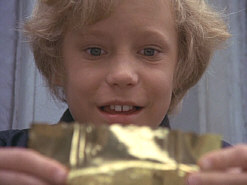 Every once in a while I check out something that I remember - usually fondly - from my childhood. Prime examples include youthful faves The Towering Inferno and Jaws 2. Few go quite so far back as 1971's Willy Wonka and the Chocolate Factory. I saw this when I was exceedingly young - it arrived during my fourth year of existence - but I still remember it pretty well. I genuinely loved this film as a child, and I also adored the Roald Dahl book on which it was based, Charlie and the Chocolate Factory as well as its sequel, Charlie and the Great Glass Elevator). Hey, I even chowed down the Wonka brand candy - gotta love those Scrumdiddlyumptious bars!
Every once in a while I check out something that I remember - usually fondly - from my childhood. Prime examples include youthful faves The Towering Inferno and Jaws 2. Few go quite so far back as 1971's Willy Wonka and the Chocolate Factory. I saw this when I was exceedingly young - it arrived during my fourth year of existence - but I still remember it pretty well. I genuinely loved this film as a child, and I also adored the Roald Dahl book on which it was based, Charlie and the Chocolate Factory as well as its sequel, Charlie and the Great Glass Elevator). Hey, I even chowed down the Wonka brand candy - gotta love those Scrumdiddlyumptious bars!
I always assume a risk when I check out a childhood favorite. With Wonka, if it turned out to be a dud, that meant yet another little piece of my past shot to bits. That's always the danger when you decide to see if something's as good as you remember.
Thankfully, Wonka proved to be a success. Indeed, it seemed to be one of those rare films that offered nearly equal charms for both kids and adults alike. Actually, the film seemed somewhat split in its appeal to the two groups. Wonka follows young Charlie Bucket (Peter Ostrum) and his rather financially depressed family. Charlie lives with his mother and both pairs of grandparents, none of whom have departed their beds in decades. Nonetheless, they give him lots of support, especially from his Grandpa Joe (Jack Albertson).
During the film’s first half, we watch the panic created when reclusive candy maker Willy Wonka (Gene Wilder) decides to open his fantastic factory to five lucky families. In a masterful marketing move, the only way to win a slot is to find a “golden ticket” inside a Wonka Bar. This causes a nationwide frenzy, and we gradually meet all of the children who obtain the tickets. These include boob-tube-obsessed Mike Teevee (Paris Themmen), crass, gum-smacking Violet Beauregarde (Denise Nickerson), spoiled brat Veruca Salt (Julie Dawn Cole), and tubby glutton Augustus Gloop (Michael Bollner). Not surprisingly, unassuming little Charlie ends up the final component of the group.
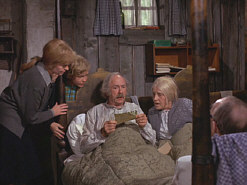 The second half of Wonka takes each kid and one family member within the confines of the magical building. While they witness some spectacular sights, all is not perfect, as the factory forms a kind of morality mall. One by one, the different kids fall victim to their vices, except for pure-hearted and kind Charlie.
The second half of Wonka takes each kid and one family member within the confines of the magical building. While they witness some spectacular sights, all is not perfect, as the factory forms a kind of morality mall. One by one, the different kids fall victim to their vices, except for pure-hearted and kind Charlie.
I found the first segment to provide the most entertainment. The second half was pretty good too, but I thought that it seemed more kid-oriented. Those annoying Oompa-Loompas got on my nerves, and the not-very-veiled warnings to the young 'uns about the fates they’ll experience if they misbehave also became a bit grating at times. Granted, the moral of the story was also aimed at overindulgent parents, but it seemed so heavy-handed that I thought it was meant more for little ears.
Most of the pleasure I derived from the second half of Wonka came from Gene Wilder's deft performance as old WW himself. Wonka's a shifty character; it's very difficult to decide from moment to moment if he's a decent fellow or if he's quite malicious. He's definitely somewhat sadistic; he doesn't look terribly upset when the nasty little children receive their comeuppance. In fact, he borders on being the John Doe - from Se7en - of the candy bar set!
To his credit, Wilder worked to make sure we never quite got a handle on Wonka's true intentions. Even at the end, when what appeared to be his true desires and thoughts emerged, I still remained suspicious of him. Wilder managed to show us the positive and charming side of Wonka while he always kept that touch of semi-perversity and eccentricity fairly close to the surface. Wilder's performance seems to be one of the main reasons this film stays so well regarded.
Not the same can be said for Peter Ostrum's exceptionally bland performance as Charlie. Why is it for every Edward Furlong or Haley Joel Osment that casting directors find, we get ten Peter Ostrums or Jake Lloyds? Those kids give international talent searches a bad name. To be fair, Ostrum wasn't as disruptively bad as Lloyd was in The Phantom Menace, but he's nothing more than a cipher and as such, he never really compelled us to care about the character.
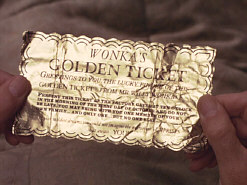 Contrast his performance with that of Paul Terry in a more recent adaptation of a Roald Dahl novel, 1996's James and the Giant Peach. Terry offered much more compelling work, even though he received only a fraction of the screen time due to Ostrum since most of James' scenes depicted him as an animated character. Emotionally, Ostrum possessed two modes: happy and sad. Unfortunately, his "happy" looked like "stunned" whereas his "sad" came across as "constipated." Ostrum's lack of range didn't really matter during the second half of the film - Charlie had little to do once they arrived in the factory - but it did hurt the first half, since I never actually cared if Charlie found the stupid winning ticket or not. James mattered to me, as he offered a sympathetic and appealing character, but Charlie? Eat your cabbage soup and shut up, you pasty-faced little troll!
Contrast his performance with that of Paul Terry in a more recent adaptation of a Roald Dahl novel, 1996's James and the Giant Peach. Terry offered much more compelling work, even though he received only a fraction of the screen time due to Ostrum since most of James' scenes depicted him as an animated character. Emotionally, Ostrum possessed two modes: happy and sad. Unfortunately, his "happy" looked like "stunned" whereas his "sad" came across as "constipated." Ostrum's lack of range didn't really matter during the second half of the film - Charlie had little to do once they arrived in the factory - but it did hurt the first half, since I never actually cared if Charlie found the stupid winning ticket or not. James mattered to me, as he offered a sympathetic and appealing character, but Charlie? Eat your cabbage soup and shut up, you pasty-faced little troll!
Jack Albertson fared a little better as Charlie's Grandpa Joe, but his role suffered from the fact that it really didn't need to exist. Early on we saw that Charlie has a strong connection with Joe, but I never detected any real reason for this other than Joe seemed to believe in Charlie just a little more than his other relatives, who all appeared quite nice, nonetheless. While the problem with Charlie stemmed from the actor's lack of personality, Joe's issues mainly concerned the general uselessness of the character himself. Joe's just kind of there, without much purpose. Still, Albertson was a fine actor, and I enjoyed seeing him.
The remainder of the supporting came across more strongly. Julie Dawn Cole offered what remains the definitive portrait of a true brat as that nasty piece of work called Veruca Salt. Obviously the filmmakers recognized the power of Salt since she was the only one of the bad kids to get her own song. Also good was Denise Nickerson as crass little Violet Beauregarde; sometimes she didn't seem quite nasty enough - wanna make my Violet more violent! - but she still shined.
The two additional boys in the group were perfectly adequate, but they didn't make as strong an impression as the girls. Bollner’s Augustus received very little screen time, and Themmen really needed to be more loud and obnoxious as Mike. However, for my money, Gloop had the best introduction of the bad kids; when an interviewer asked him how he felt upon finding the first golden ticket, he barely paused from his meal to shout, "Hungry!"
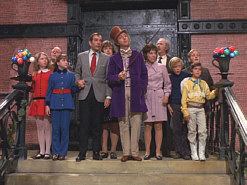 I'm not a fan of musicals, and that distaste carried over to Wonka. Really, I don't see the need for the songs; they mostly seemed to get in the way. Too often it just felt like someone decided "Time for a number!" so the characters dropped everything to sing. Some tunes were better integrated than others, such as Salt's piece, but I can't say that I understand why they bothered to make this a musical; it would have worked even better without all the showtunes.
I'm not a fan of musicals, and that distaste carried over to Wonka. Really, I don't see the need for the songs; they mostly seemed to get in the way. Too often it just felt like someone decided "Time for a number!" so the characters dropped everything to sing. Some tunes were better integrated than others, such as Salt's piece, but I can't say that I understand why they bothered to make this a musical; it would have worked even better without all the showtunes.
I may receive flack for this, but the songs from the Oompa-Loompas were probably my least favorite aspect of the film. Okay, they're catchy tunes which will stick with you for pretty much forever, but I genuinely hated the scenes in which their songs were performed. To have the Oomps warble annoying little ditties that completely spell out the various morals seemed ridiculously redundant. I mean, it's not like Mike Teevee or Veruca Salt were subtle character studies; we picked up that they paid for their overindulgences without having some little people sing it to us.
It felt inconsistent that we had a character as evasive as Wonka but we kept getting hammered with these "Afternoon Special" morals. I have no problem with the various messages sent by the film; I just didn't care for the overbearing method in which they were frequently delivered. Then again, the Oomps might be just fine and I'm simply cheesed off because now I'm going to have that silly melody running through my head for the next few days - who knows?
Despite these faults and a little questionable acting, Willy Wonka and the Chocolate Factory remains a winner of a movie. It's aged quite well and it shows no signs of losing appeal to both kids and adults.
The DVD:
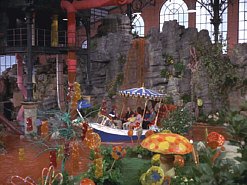 Willy Wonka and the Chocolate Factory appears in a fullscreen transfer on this single-sided, double-layered DVD; due to those dimensions, the image has not been enhanced for 16X9 televisions. Although the old 1997 25th anniversary edition DVD provided both fullframe and widescreen versions, and some sources indicated that the same would be true of the 30th anniversary package, this was not the case. The DVD only features the 1.33:1 version of Wonka. Some controversy exists about the nature of the original film. A number of movies - such as Pee-Wee’s Big Adventure - exposed the entire frame as they were shot, and theatrical screenings would simply mask the top and bottom to fit the 1.85:1 dimensions. Although I strongly prefer original aspect ratios, I don’t object horribly to DVDs that provide these “open matte” images; they distort the director’s choices because they add unnecessary information, but at least they don’t crop anything from the sides.
Willy Wonka and the Chocolate Factory appears in a fullscreen transfer on this single-sided, double-layered DVD; due to those dimensions, the image has not been enhanced for 16X9 televisions. Although the old 1997 25th anniversary edition DVD provided both fullframe and widescreen versions, and some sources indicated that the same would be true of the 30th anniversary package, this was not the case. The DVD only features the 1.33:1 version of Wonka. Some controversy exists about the nature of the original film. A number of movies - such as Pee-Wee’s Big Adventure - exposed the entire frame as they were shot, and theatrical screenings would simply mask the top and bottom to fit the 1.85:1 dimensions. Although I strongly prefer original aspect ratios, I don’t object horribly to DVDs that provide these “open matte” images; they distort the director’s choices because they add unnecessary information, but at least they don’t crop anything from the sides.
Wonka appears to provide an open matte transfer. I didn't get the chance to
compare every minute of the disc with the old letterboxed one, but I went
through much of it, and I detected no instances of cropping on the sides.
All of the scenes showed similar information on the sides with additional
material visible on the top and bottom. In addition, the scene in which
Violet "expands" clearly showed the hose that inflated her; that would be
cropped out for the letterboxed picture, but appeared in the open matte
version.
By no stretch of the imagination do I support the lack of original aspect ratio presentation, but this fullscreen edition of Wonka has inspired an immensely vitriolic response from many folks. Common opinions feel that the DVD includes a cropped, pan and scan abomination, but the truth differs from that sentiment. I’m also bothered that Wonka fails to appear in its theatrical dimensions, but the anger aimed at this disc appears to be out of proportion.
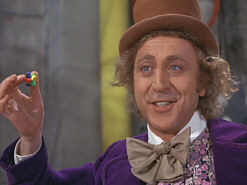 Of course, it’s easier for me to feel less bothered by the fullscreen transfer because I’ve actually seen the disc, and it offered a tremendous experience. I thought the original DVD was a disaster, as the movie usually looked muddy and fuzzy. However, the new disc provided a consistently fine presentation that totally blew away the old one.
Of course, it’s easier for me to feel less bothered by the fullscreen transfer because I’ve actually seen the disc, and it offered a tremendous experience. I thought the original DVD was a disaster, as the movie usually looked muddy and fuzzy. However, the new disc provided a consistently fine presentation that totally blew away the old one.
Sharpness was a major concern during the 1997 DVD, but not any more. Wonka offered a nicely crisp and detailed picture at all times. One or two wider shots displayed the smallest amount of softness, but these instances were very minor. As a whole, the film provided an accurate and distinct image. Jagged edges presented no concerns, and only a few small instances of moiré effects occurred. I noticed that a checked collar worn by Charlie’s mother and a jacket donned by Violet’s dad demonstrated slight shimmering, but otherwise this was a tight presentation.
Print flaws decreased radically on the new DVD. Some light grain appeared at times, though it was usually caused by special effects elements. For example, scenes such as Charlie’s first glimpse of the factory and the golden geese utilized compositing, and those elements introduced the modest grain. A few other sequences showed some grain as well, but it always stayed minor and essentially inconsequential. Other defects seemed to be similarly modest. I witnessed a few speckles and a spot or two, but overall the print looked nicely clean and fresh.
Colors stood out as the only positive aspect of the original DVD, and they continued to shine here. Wonka featured a wonderfully vibrant and vivid palette, and the DVD reproduced the tones with fine boldness and accuracy. From Wonka’s purple garb to red clothes worn by Violet and Charlie to the green hair and orange faces of the Oomps, colors always appeared fantastically bright and distinctive. They really leapt off the screen, and they added a lot to the movie.
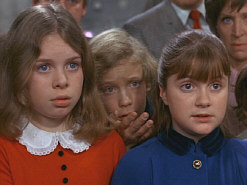 Black levels also seemed to be nicely deep and rich, and shadow detail usually looked appropriately heavy. A few shots were slightly thick, such as Charlie’s early visit outside the factory. That instance seemed to occur due to the use of day for night photography, and it still offered a clearer image than usual for that style of work. As a whole, the low-light situations were neatly visible and showed good balance. Ultimately, the image of Willy Wonka offered a very fine visual experience.
Black levels also seemed to be nicely deep and rich, and shadow detail usually looked appropriately heavy. A few shots were slightly thick, such as Charlie’s early visit outside the factory. That instance seemed to occur due to the use of day for night photography, and it still offered a clearer image than usual for that style of work. As a whole, the low-light situations were neatly visible and showed good balance. Ultimately, the image of Willy Wonka offered a very fine visual experience.
While the new DVD of Wonka showed its biggest improvement in regard to picture quality, the film’s Dolby Digital 5.1 soundtrack also seemed a little cleaner. The mix took the movie’s original monaural stems and translated them into a modest but decent little soundfield. Much of the audio remained anchored to the center channel, and most effects usage seemed to feature modest ambience. On occasion, some discrete elements popped up in the side channels, but usually the effects seemed to stay with general atmosphere that lacked much delineation. On the other hand, music showed solid stereo separation, as the score and songs spread neatly across the forward spectrum.
Surround usage usually stuck with light reinforcement of the forward channels, and the score also dominated that side of the package. The music swelled nicely from the rear channels, but no distinct instrumentation or vocals came from back there. As for the effects, they seemed very minor for the most part, but a few exceptions existed. For example, the sound of the chocolate waterfall occasionally came from the right rear speaker during appropriate scenes. These gestures created a decent ambience, but they didn’t reinvent Wonka’s monaural wheel. Nonetheless, I was pleased with the extra breadth and dimension offered by the remix.
Audio quality occasionally showed its age, but overall I thought Wonka sounded good for a 30-year-old film. Dialogue seemed slightly thick at times, and some lines betrayed mild edginess. However, most of the speech came across as reasonably natural and distinct, and I discerned no problems related to intelligibility. Effects were also a bit on the thin side, and they lacked great prominence. Nonetheless, they showed no signs of distortion or other flaws, and they represented their objects with acceptable accuracy.
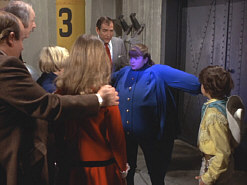 Music again became the strongest element of the mix, though it still betrayed its age to a degree. The score and songs offered surprisingly fine depth, as bass response sounded fairly warm and strong, which added a nice layer to the track. Highs were a bit flat and restricted, however. Those aspects still came across as reasonably crisp and distinct, but could come across as a little muted at times. Nonetheless, I thought Willy Wonka provided a perfectly solid soundtrack for an older film, and I was consistently pleased with the presentation.
Music again became the strongest element of the mix, though it still betrayed its age to a degree. The score and songs offered surprisingly fine depth, as bass response sounded fairly warm and strong, which added a nice layer to the track. Highs were a bit flat and restricted, however. Those aspects still came across as reasonably crisp and distinct, but could come across as a little muted at times. Nonetheless, I thought Willy Wonka provided a perfectly solid soundtrack for an older film, and I was consistently pleased with the presentation.
The original DVD of Wonka skimped on extras, as it provided only a batch of text production notes and two trailers. The new package omits the former and one of the latter; we still get the original theatrical trailer, but a reissue clip fails to appear. However, it adds a slew of new features that more than compensate for these minor losses.
First up is the prime attraction, an audio commentary from all the “Wonka Kids”. We hear from all five of the movie’s main children, played by Peter Ostrum, Denise Nickerson, Michael Bollner, Julie Dawn Cole and Paris Themmen. They were recorded together for this running, screen-specific track. Whoever came up with the idea deserves a prize, for it’s a brilliant idea. The commentary can’t quite live up to the grandness of the concept, but it’s still a very fun and lively little experience.
Throughout the track, we learn a slew of fun little details about the making of the film. Because it concentrates on the kids, we don’t hear too much of the more “adult” aspects of creating the flick, so don’t expect nuts and bolts details about the project. However, we get a compelling perspective that covers lots of notes one wouldn’t normally expect to learn. The five provide entertaining minutiae about their experiences, and they offer a load of cute and winning anecdotes.
Despite the emphasis on the “kid’s-eye” view, we still get a fair amount of additional details. For example, we hear a few changes between the book and the film, and we get some reflections on other perspectives, such as the Oompa-Loompa who apparently thought he was really guiding the Wonkatania. The participants maintain a very warm and lively chemistry and they make the piece quite charming. Ultimately, I found the commentary to be fairly terrific and it should be strongly embraced by Wonka fans.
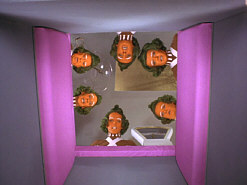 Also positive is a new documentary called Pure Imagination: The Making of Willy Wonka and the Chocolate Factory. This 30-minute and 25-second program offers the usual combination of film clips, behind the scenes footage, and interview segments. All of the latter are new recordings, and we hear from director Mel Stuart, producer David L. Wolper, uncredited writer David Seltzer, and actors Gene Wilder, Peter Ostrum, Denise Nickerson, Michael Bollner, Paris Themmen, Julie Dawn Cole, and Rusty Goffe. As a whole, this show was a little brief, but it offered a fun and informative experience.
Also positive is a new documentary called Pure Imagination: The Making of Willy Wonka and the Chocolate Factory. This 30-minute and 25-second program offers the usual combination of film clips, behind the scenes footage, and interview segments. All of the latter are new recordings, and we hear from director Mel Stuart, producer David L. Wolper, uncredited writer David Seltzer, and actors Gene Wilder, Peter Ostrum, Denise Nickerson, Michael Bollner, Paris Themmen, Julie Dawn Cole, and Rusty Goffe. As a whole, this show was a little brief, but it offered a fun and informative experience.
In many ways, “Pure Imagination” resembled the audio commentary in that it focused mainly on anecdotes from the set. We learn some good details about the production’s genesis and other aspects of the movie’s creation, but most of it dealt with stories about the different occurrences. Even though all of the “Wonka Kids” reappear, very little information was repeated from the commentary, and the addition of Wilder was very positive; he added a lot of good notes about his involvement in the movie. I also enjoyed the ending reflections during which the “kids” told us what they did after Wonka.
The footage from the set was crudely-shot and generally not all that great, though the DVD had a few decent elements. All of it was silent except for the most compelling snippet. That one showed a demo of a Wonka song. Overall, I wish “Pure Imagination” had been longer and more detailed, but it still offered an entertaining and useful piece.
Another video program provides an original 1971 Featurette. This mainly focused on the work of art director Harper Goff. It mixed film snippets and more of the same kind of shots from the set that appeared in “Pure Imagination”. In addition to comments from an unnamed narrator, voice-over statements came from Goff and author Roald Dahl. The four-minute piece didn’t offer much information, but it was a mildly interesting look at the film’s design nonetheless.
After all of these adult-oriented pieces, the next extra clearly seemed to be aimed at the little ones in the audience. We get Sing-Along Wonka Songs for four of the films tunes: “I’ve Got the Golden Ticket”, “Pure Imagination”, “I Want It Now” and “Oompa-Loompa-Doompa-De-Do”. These simply showed the film footage with highlighted text along the bottom of the screen. Since the DVD already included subtitles, this featured seemed to be a little pointless, but I suppose it didn’t hurt anything. At least it isolated the four tracks, and since they can be accessed together via the “Play All” option, you can easily create your own extended Wonka karaoke sequence.
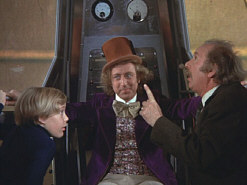 A few other small extras round out the package. We find a Photo Gallery with 18 decent production shots, and we also get the film’s original trailer. As I noted in my review of the old DVD, I thought this was a terrible clip; it gives away far too much of the plot. Finally, we discover a “Cast and Crew” section. This lists the main actors and technical workers, but it adds no information about their lives. Instead, we get brief listings for some of the characters, like similar features on Boogie Nights and Sugar and Spice. These fake biographies cover Wonka, Grandpa Joe, and all five of the kids. They don’t tell us much, but they’re still a cute little addition.
A few other small extras round out the package. We find a Photo Gallery with 18 decent production shots, and we also get the film’s original trailer. As I noted in my review of the old DVD, I thought this was a terrible clip; it gives away far too much of the plot. Finally, we discover a “Cast and Crew” section. This lists the main actors and technical workers, but it adds no information about their lives. Instead, we get brief listings for some of the characters, like similar features on Boogie Nights and Sugar and Spice. These fake biographies cover Wonka, Grandpa Joe, and all five of the kids. They don’t tell us much, but they’re still a cute little addition.
While I dislike the decision made by Warner Bros. to present Willy Wonka and the Chocolate Factory only in a fullframe transfer, the result succeeds nonetheless. The movie remains as fun and engaging as ever after 30 years; it’s one of the rare flicks that works equally well for adults and kids, and it holds up nicely through repeated viewings.
As for the DVD itself, its main flaw stems from the lack of an original aspect ratio presentation. However, the transfer appears to be an “open matte” affair, and I felt it did not negatively affect my enjoyment of the movie. The picture looked splendid, and the sound added a solid level of activity as well. Add to this a mix of nice, new extras, and the 30th anniversary edition of Willy Wonka has more than enough positives to outweigh the lack of picture matting. Many may disagree, and more power to them. Nonetheless, I was pleased with this DVD and I feel most Wonka fans will really enjoy it.
Note: after all the dischord caused by this fullscreen version of Wonka,
Warner Bros. quickly caved and announced a letterboxed edition of the
special edition. That package is identical to this one except for the
widescreen image. To read about it, please click here.
|
To rate this movie go to Willy Wonka: Widescreen Edition.
[an error occurred while processing this directive]
|